- Home
- Harlan Ellison
The Other Glass Teat
The Other Glass Teat Read online
The Other Glass Teat
The Harlan Ellison Collection
Harlan Ellison
For
WALTER KOENIG
Déjà vu
I have been in this elevator before.
INTRODUCTION
Days of Blood and Sorrow
I’m writing this soon after New Year’s Day, 1975. The Port Chalmers Flu has struck me down and I lie here in bed with the typewriter propped on my lap, bottles of expectorants, Actifed, Contac and Empirin all around me, and the little tv on the foot of the bed burbling Let’s Make a Deal.
I don’t know which will kill me first: the flu or Monty Hall.
There is a woman wearing a toilet plunger on her head and her braided hair be-ribboned with asswipe. I can’t tell what it is she’s won, nor even what Monty is offering her in exchange for it, because I have the sound turned off. I may be down, but I ainout.
From time to time in the writing of this introduction, I will keep you apprised of what daymares flit across my screen; if I have to be miserable, so do you. We can go nutso together.
As you may have gathered, I watch quite a bit of television. Friends (and blind dates who’ve decided they don’t care for the guy their girlfriend fixed them up with and wish they were back home washing their hair) give me a lot of static about how much television I watch. Almost nobody I know will openly cop to sitting in front of the box sucking on that glass teat. They all do it. Most of them would sooner have a haircut from Jack the Ripper than admit when they get home from work they kick off their shoes and watch reruns of Gilligan’s Island. They’d sooner share a toothbrush with a leper than admit that given the choice between a brilliant documentary on the lifestyle of the Jívaros of Ecuador on the educational channel and an Ann-Margret Special on NBC they’d pick the latter over the former every time. But they all do it. So do I. We’re a 21" eyeball nation, weaned from the start by flickering phosphor-dot images.
But there’s still that hateful snobbishness about tv. Dips my age put it down without fail, without redeeming remark, without a suggestion that the medium has a saving grace. Yet every night, if one selects one’s viewing with anything greater than the brain power of a maggot, one can find at least an hour or two of worthwhile programming. It might be Tracy Keenan Wynn’s incredible script for “The Autobiography of Miss Jane Pittman” or a rerun of those antic spirits John Steed and Mrs. Emma Peel in The Avengers or Olivia Newton-John on The Midnight Special or the genuinely bizarre ghouls of M*A*S*H.
For those who tune in to garbage, who have the last act of Barnaby Jones figured out three minutes into the first act, who are disappointed that Jack Lord can’t act one-millionth as brilliantly as Al Pacino’s left instep, disappointment is a self-fulfilling prophecy. Or, as a bad movie script once phrased it, “Lie down with pigs, get up smelling like garbage.”
Television is the popular entertainment. It is no better, I suspect, and no worse, I’m sure, than any of the popular entertainments were, when they were serving the needs of the mass. Pulp magazines, “B” movies, vaudeville. They were all the honorable forefathers of what we get on the tube every day.
(A bald, sallow, snake-eyed hypester is silently trying to sell me 22,000 acres of California land wrested from the unwilling hands of Spanish settlers and Amerinds. I don’t have to hear what he’s saying, I know this one by heart. He’s telling me I can erect a terrific ticky-tacky cracker box of a vacation home on this wonderful acreage. He doesn’t mention that the nearest water is eight miles away, nor that they haven’t put in any “conveniences” like electricity or roads. Fuck him. Onward.)
I like to think of Theodore Sturgeon’s Law when I hear the snobs badrapping tv: “90% of everything is crap.” That means 90% of everything is mediocre, as I read the Law. And that goes for books, plays, cars, puddings, people and movies. The percentage is probably higher with politicians.
So if 90% of television is crap, mediocre, banal, yawn-evoking…nobody promised you a rose garden.
There’s still that 10% and it’s often as good as the best books, movies…well, you know where I’m going.
Add to that simple philosophy that tv is keeping alive old movies and introducing them to a new generation, and the tube doesn’t seem as awful as it’s slammed to be. Huck Barkin’s daughter, Tracy, is fifteen. She would rather pass up a studio screening of something as mindless as “Thunderbolt and Lightfoot” to see Fred and Ginger in “Flying Down to Rio” (1933). When I went to dinner at Huck and Carol’s a few weeks ago, I was wearing a T-shirt that said Rick’s Café Américain on it. There were four or five people at table when I sat down, and they all looked at it without knowing what it meant. Only fifteen-year-old Tracy, when she came to the table, grinned and recognized the name of Humphrey Bogart’s nightclub in Casablanca. At that moment I felt very kindly toward television. In a time when young people seem sadly disinterested in the past—even a past as recent as eight or ten years ago—tv serves a necessary function. It becomes the handservant of Santayana’s warning that, “Those who cannot remember the past are condemned to repeat it.”
Something that periodically straightens kids’ heads about the difference in time-frames between, say, the Early Cretaceous and the U-2 imbroglio of Francis Gary Powers can’t be all bad.
(A woman is trying to keep her 1500-lb. mastiff from savaging her hand as she pours kibble into a bowl. I wonder if she knows they’ve soaked that kibble in lamb’s blood and that the poor mastiff hasn’t been fed since 1947. Oh well.)
Okay. So that’s what’s good about tv. But if you’ve bought this book having read its predecessor, THE GLASS TEAT, you know that as a writer who works in the tv industry—quite apart from my feelings as a viewer—my enchantment with the medium is anything but constant. Without recourse to the remark crude, I have been known to point out that tv sucks.
And so what we have here, in this sequel to THE GLASS TEAT, are fifty more columns of jaundiced and lament-laden (for the most part) diatribe against the corrupt and inept and mediocre bulk of what goes down on that tube.
If you’ve bought this volume without having read or heard about THE GLASS TEAT, I urge you to go find it and get all the background about how and where these columns were first published. Not to mention the first 52 columns, because the numbering in this book picks up at #53 and that might confuse the hell out of you if you didn’t know there was a book that went before this one. Am I getting confusing?
Look: for those who bought this book in good faith and feel that having to go out and buy another book to figure out what’s going on in this book is a calculated rip-off, I will quickly summarize the plot of the heart-stopping action that went before. Pay attention.
September 1968: Art Kunkin, then publisher of the Los Angeles Free Press, asked me to write for the Freep. I suggested a tv column. He said fine. First column appeared in the Freep on 4 October 68. It went on for two and a half years. I stopped writing it because I figured if a guy couldn’t say everything he had to say about tv in two and half years, he shouldn’t have started in the first place, because he didn’t have anything important to say anyhow. In 1970, the first years’ columns (1968–70) were published by Ace Books. Sales started off sensational, book was moving everywhere, hundreds of dynamite reviews, thought we had a paperback bestseller on our hands. Suddenly, the book died. It was being returned by the boxload to Ace. Discovered it hadn’t had an incredible 90% sale of the first print run—as we’d been led to believe by early reports—but had sold out on the East and West Coasts and was being shipped back from everywhere else faster than a speeding bullet. August 1970: I signed a contract for a sequel, THE OTHER GLASS TEAT, with Ace. This was when they thought they had a 90% sale. But then the returns started
deluging Ace. For no reason anyone could figure out. Then, without warning, Ace jumped out of the contract for the second book. Told me to keep the advance money, just let them out of the contract. Unheard-of for a publisher like Ace, to let me keep the money. Books still thundering in to the Ace return warehouse. Thousands and thousands of copies. THE GLASS TEAT was being used, by that time, in many colleges and universities, in their media classes; it was being praised by everyone from Cronkite to The New Republic; it had become something of an underground rallying-point; orders from lone individuals swamped Ace’s offices. But the book had been effectively wiped off the newsstands. Didn’t learn till four years later that Spiro T. Agnew himself had taken offense at a line in one of my columns about him (a line that appears in this book, dealing with Spiro’s sexual proclivities and The Reader’s Digest) and his office had passed the word the book was to be, uh, er, how shall we put it…repressed. Last February Pyramid took its life in its hands and re-released THE GLASS TEAT. Here it is June, and for the first time in this or any other language, THE OTHER GLASS TEAT is at long last published. Four years after Ace ran scared.
Anyhow, that’s the background. It’s written in greater detail and (as Kleindienst would phrase it, my fellow Americans) specificity in the new introduction I wrote specially for the Pyramid edition of THE GLASS TEAT, just so you won’t think I’m some sort of conspiracy fruitcake.
And just to prove I’m leery of conspiracy bullshit, read the columns in this book—particularly the open letter to my mother—and see if I wasn’t on to the whole suppression of dissent program of Dick and The Boys. It’s all here, two years before you even heard of Watergate. Nyah, nyah, I told you so!
(What a terrific thrill, to go back and read those words in 1970–72 and see that I was one of the few clowns who were warning you against Nixon’s war on the media. What a thrill to encounter the following quotes in William Safire’s book, BEFORE THE FALL: AN INSIDE VIEW OF THE PRE-WATERGATE WHITE HOUSE. Safire was a senior speech writer for Nixon during his first term.
(“Was there a conspiracy, as Walter Cronkite of CBS once solemnly charged, on the part of the Nixon administration to discredit and malign the press?
(“Was this so-called ‘anti-media campaign’ encouraged, directed, and urged on by the president himself?
(“Did this alleged campaign to defame and intimidate Nixon-hating newsmen succeed, isolating and weakening them politically? And did it contribute to the us-against-them divisions that then cracked back at Nixon after his election victory?
(“The above questions are slanted so as to elicit a ringing response of ‘Nonsense!’ from people who resist the wave of condemnation washing over everything connected with the Nixon administration. But the answer to all those questions is, sadly, yes….
(“I must have heard Richard Nixon say ‘the press is the enemy’ a dozen times, and there was no doubt that his instincts were to do battle with what he was certain was an ideological bias against nonliberals combined with a personal bias against him.”)
But these columns running from early in 1970, well into 1972, are more—to me, at any rate—than a compendium of gardyloos against the Nixon/Agnew axis. There’s a lot of that, because that’s what was going down at the time, but there’s a whole lot of looking-around at the condition of life in these United States, as interpreted by television.
(It’s now about 3:15 and I’m watching a bunch of people in loud Hawaiian shirts playing something called The Diamond Head Game. I suspect their heads are made of Jell-O and not Diamonds, because they’re making asses of themselves. One man is standing in a big plastic tube, with a funny little pouch around his waist, and he’s being assaulted by paper money being blown all around him inside this big tube. He’s grabbing like a sonofabitch for as much as he can get, thereby epitomizing for me, as I lie here in sight of death through nasal drip strangulation, the core greed and venality of the average American schlepper who allows himself to be demeaned in front of millions of home-trapped housewives and invalid shut-ins like myself. As I watch this jerk, I only have one wish: dear Lord, change all that paper money into silver dollars and brain him to death. Is it any wonder I’m turning into a misanthrope?)
Where was I? Oh, yeah.
The period of time covered by these columns is what I’ve come to call our days of blood and sorrow. Kent State, Laos, My Lai, Jackson State, the March on Washington, the student riots, the endless busts of dissenters. But things have changed considerably. The Sentient Sixties are gone and the Sluggish Seventies are with us. All the kids who lost their college careers, their jobs, their security, all those who lost their lives or their citizenship…they’re gone now. Gone to middle-class struggles for subsistence living, gone to dull academic jobs, gone to little boxes at big corporations, gone to dust or Canada. And the colleges are loaded with enlightened self-interest now. The generation so many gave their hopes and their lives to set free have enslaved themselves with the vision of Diamond Head blowing thousands of paper dollars around them as they grub in the air for as much as their pudgy little paws can hold. I’ve talked about this before, don’t let it depress you; it’s only disillusionment.
Where I’m coming from is that Spiro succeeded. He and the King Thug Nixon managed to clobber the entire dissent movement. The revolution came and went and plus ça change, plus c’est la même chose, which translates as Hey, Sid, ain’t it time to program another doctor series in the nine-to-ten slot?
But that’s your problem, not mine.
In here, we have fifty little time capsules, including a complete television script I wrote for The Young Lawyers, a series you may remember from the Season of Relevance. It is the original version, not what was finally aired, and you will find comment before, after and during that will show you how it is to work in television.
In here, we have comment on Nanny and the Professor and Standard Oil’s big tv campaign for F-310, their anti-pollutant additive, and Baxter Ward, an LA-based newscaster. But things are slightly different now, after all, Richard Long, who played the Professor, is dead; Standard Oil stopped using F-310 when it became obvious to consumers that it was a bullshit ripoff; and Baxter Ward is now on the board of the LA County Supervisors.
In here, we have a couple of years in the life of your humble columnist and his faithful country, Ammurrica.
Like the Early Cretaceous, it’s a book of memories, probably no more relevant to college readers than the U-2 flyover or the name Francis Gary Powers. Maybe.
The only trouble is, I keep thinking of Santayana’s quotation, and the phrase what goes around, comes around keeps ringing in my head.
(There is a lady with a pained expression on her face who is telling me if I have a ringing in my head I ought to take six of these, or three of these, or one of those.)
Maybe I’ll just turn off the set and get some sleep.
—Harlan Ellison
3 JANUARY 75
53: 13 FEBRUARY 70
Shotgun week. Random thoughts on some randy topics.
I always like to know if the men whose criticism I read are beyond corruption, above reproach, out of reach of their own base desires and greeds. I think you’d like to know that about me, as well. So to put your mind at rest, be advised: I can be had. (In fact, I’m such an easy lay, I don’t understand why I don’t get more dates. But, be that as it may…) How many other critics do you know who’ll own up to being corruptible?
I mention this, because I’m going to make some remarks about a new ABC situation comedy, Nanny and the Professor, and I want you to know out front that I met and had lunch at 20th with the star, Ms. Juliet Mills, and she is a stunner. She is English, which gives her a runaway head start with me…as friends who know my ladyfriend, Louise, will tell you. But she is also reserved, witty, charming, totally professional, and an Actress with the cap A who speaks about having been on the London stage but doesn’t lumber the listener with hideous starlet talk about her agent, her parts, her dressing room, her likes and
dislikes in show biz, ad nauseam. From all this you may gather that I found Ms. Mills (who is related by birth to John and Hayley and that whole crowd, but who need borrow no credentials from any of them) quite the winner.
And from that you may understand my distress at having to report that Nanny and the Professor is about as nitwitty a piece of persiflage as I’ve been forced to watch in many a season. I think, for dumbness, it even rivals The Good Guys, Gomer Pyle, and Gilligan’s Island. But it isn’t quite as bad as The Lucy Show—only because one has Ms. Mills and the other has Lucy.
The situation is a widower, a physics professor, played by Richard Long (whose range of emotions in this show flings itself from boredom to bemusement), with three little moppets, and an English “nanny” with claims to metaphysical/supernatural/leprechaun-type powers. Mr. Long does what he is required to do, and tries very hard not to look like a man about to get an enema with a thermite bomb. He, like Ms. Mills, is a professional, and we should sometime dwell on the horrors through which we put our competent, craftsmanlike actors. It must be a dreadful life they lead, succored only by the nice green money people give them.
So. Ms. Mills and Mr. Long. They’re fine, acting-wise. But those three no-neck monsters, and their moronic dog, are quite another can of worms.
One cannot blame the kids. Several years ago I knew a young married couple who had a sweet child, a blond and blue-eyed moppet in whom they had dumped all their dreams and hopes. This lad had the singular and charming habit of coming downstairs during his parents’ frequent parties, standing in the center of the room where he could drink in all the attention, and announcing in a voice frighteningly like that of Walter Brennan, “I have a pee-pee!” He would then whip out of his Dr. Denton’s a pee-pee-sized penis and piss all over the rug. Well, sir, may I tell you that the first time it happened, I was a bit startled. But, being a true liberal, I shrugged and mumbled something about the kid’s doing his thing…or doing it with his thing…or something…and went back to whatever conversation it was I’d been having before the interruption. On subsequent occasions, I must say the novelty of the act wore off. It was like your second or third exposure to Jerry Lewis. (I know of few rational people who can report having had a fourth.) But the tot’s parents thought it was a wonderful expression of the child’s individuality and cleverness and perceptions about his own body and bodily functions. And they applauded wildly every time he did it. Maybe they were right; I don’t know. All I do know is that the first time the kid missed, and scored my pant leg, I stopped accepting invites to their brawls.

 Repent, Harlequin! Said the Ticktockman
Repent, Harlequin! Said the Ticktockman Broken Glass
Broken Glass Other Glass Teat
Other Glass Teat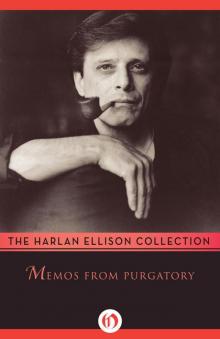 Memos From Purgatory
Memos From Purgatory I Have No Mouth and I Must Scream
I Have No Mouth and I Must Scream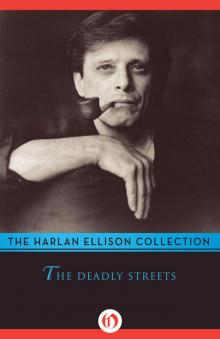 The Deadly Streets
The Deadly Streets The Glass Teat
The Glass Teat Paingod and Other Delusions
Paingod and Other Delusions No Doors No Windows
No Doors No Windows Strange Wine
Strange Wine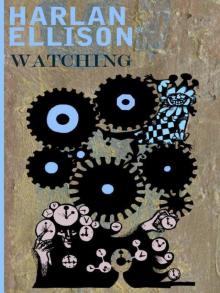 Harlan Ellison's Watching
Harlan Ellison's Watching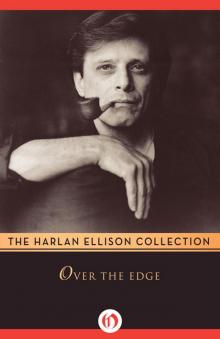 Over the Edge/An Edge in My Voice
Over the Edge/An Edge in My Voice Troublemakers: Stories by Harlan Ellison
Troublemakers: Stories by Harlan Ellison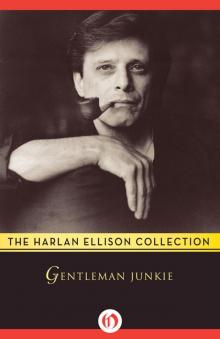 Gentleman Junkie and Other Stories of the Hung-Up Generation
Gentleman Junkie and Other Stories of the Hung-Up Generation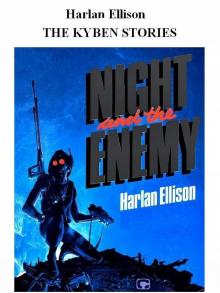 The Kyben Stories
The Kyben Stories From the Land of Fear
From the Land of Fear The Top of the Volcano: The Award-Winning Stories of Harlan Ellison
The Top of the Volcano: The Award-Winning Stories of Harlan Ellison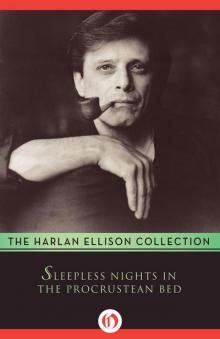 Sleepless Nights in the Procrustean Bed
Sleepless Nights in the Procrustean Bed Ellison Wonderland
Ellison Wonderland Children of the Streets
Children of the Streets Can & Can'tankerous
Can & Can'tankerous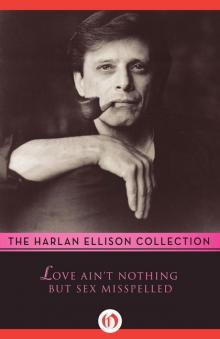 Love Ain't Nothing but Sex Misspelled
Love Ain't Nothing but Sex Misspelled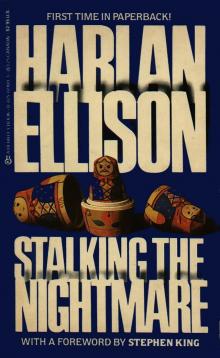 Stalking the Nightmare
Stalking the Nightmare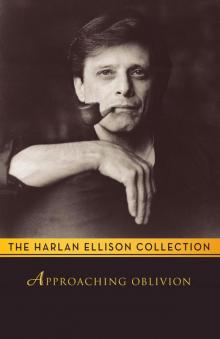 Approaching Oblivion
Approaching Oblivion Deathbird Stories
Deathbird Stories Partners in Wonder
Partners in Wonder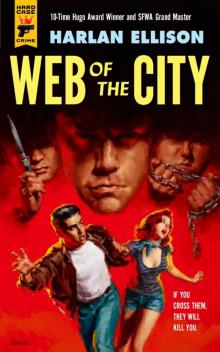 Web of the City
Web of the City Spider Kiss
Spider Kiss A Boy and His Dog
A Boy and His Dog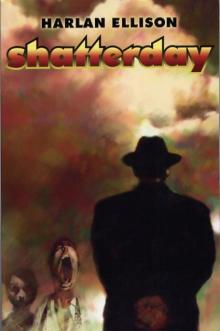 Shatterday
Shatterday Slippage: Previously Uncollected, Precariously Poised Stories
Slippage: Previously Uncollected, Precariously Poised Stories Repent, Harlequin! Said the Ticktockman
Repent, Harlequin! Said the Ticktockman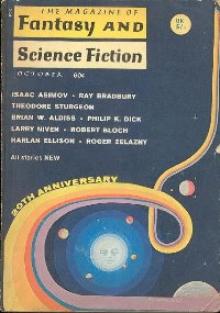 Come to Me Not in Winter's White
Come to Me Not in Winter's White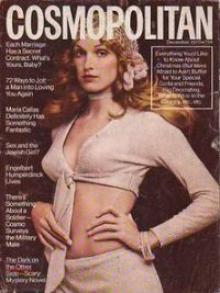 The Song the Zombie Sang
The Song the Zombie Sang The Other Glass Teat
The Other Glass Teat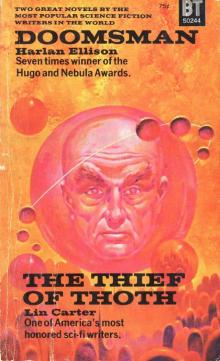 Doomsman - the Theif of Thoth
Doomsman - the Theif of Thoth The City on the Edge of Forever
The City on the Edge of Forever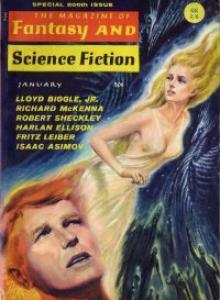 I See a Man Sitting on a Chair, and the Chair Is Biting His Leg
I See a Man Sitting on a Chair, and the Chair Is Biting His Leg The Harlan Ellison Hornbook
The Harlan Ellison Hornbook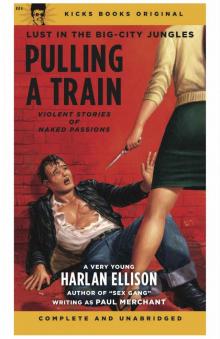 Pulling A Train
Pulling A Train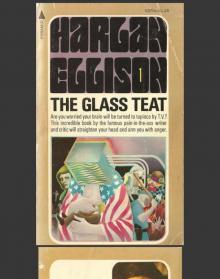 The Glass Teat - essays of opinion on the subject of television
The Glass Teat - essays of opinion on the subject of television An Edge in My Voice
An Edge in My Voice Angry Candy
Angry Candy Troublemakers
Troublemakers The Top of the Volcano
The Top of the Volcano Over the Edge
Over the Edge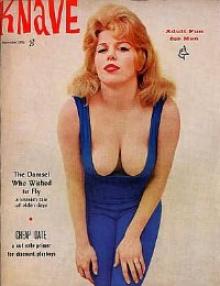 Survivor #1
Survivor #1 Slippage
Slippage